
I mean I don't really think about it. You know, do you know what
I mean I don't really think about it. You know, do you know what I often say to myself? I think you're very lucky in life if you know what you want to do.






The composer of timeless melodies, Andrew Lloyd Webber, once confessed with quiet humility: “I mean I don’t really think about it. You know, do you know what I often say to myself? I think you’re very lucky in life if you know what you want to do.” In this simple reflection lies a profound truth, one known by the ancients—that the greatest fortune is not riches, nor power, but clarity of purpose. For many wander the earth with restless hearts, but the one who knows his calling holds a treasure rarer than gold.
The ancients taught that the gods whispered destinies into the ears of mortals, yet not all could hear them. To know what you want to do is to have caught the divine voice, to have seen the flame upon the path that is yours alone. Without such vision, men labor without joy, moving like shadows from one task to another. But with it, every step, every trial, every hardship becomes meaningful, for it serves the greater fire of destiny.
Luck, as Webber calls it, is not the chance of dice but the blessing of direction. The farmer who delights in the soil, the poet who cannot rest until words are sung, the craftsman who shapes wood as though it were flesh—all are rich, though their coffers be empty. For they live not in confusion but in harmony with their own nature, and in this harmony lies a joy no coin can buy.
This teaching also warns us: pity not the one who lacks wealth, but the one who lacks purpose. For such a soul may live long but never truly live, tasting neither triumph nor fulfillment. The ancients likened it to a ship adrift, sails full but rudder lost, moving endlessly yet arriving nowhere. Better to have a humble vessel bound for a clear shore than a great ship lost at sea.
Let this wisdom echo for generations: to know what you want to do is to awaken to your own destiny. Seek this knowledge above jewels, guard it more fiercely than crowns, for it will guide you through storms and sustain you in darkness. And when you find it, labor with all your heart, for such clarity is life’s greatest gift—the secret fire that makes existence not merely survival, but song.






KTLuong Thi Khanh Tien
Andrew Lloyd Webber’s point about being lucky to know what you want to do resonates with me. It’s a reminder that some people find their calling early, while others take a more winding route. Does this mean that the latter group is somehow less fortunate, or is it more about personal growth and the experiences gained along the way? Can the journey of self-discovery itself be as valuable as knowing your path from the start?
NHChau anh Nguyen hoai
This quote makes me think about the privilege of having a clear goal in life. It’s true that if you know exactly what you want to do, it can make your decisions easier. But what about those who take time to explore different paths? Does this mean they’re wasting time, or are they just allowing themselves space to figure things out? How do we define success when there’s no one clear path?
HTHong Tham
I agree with the sentiment that knowing what you want in life is a gift. It can give you direction and purpose. But, for some, the journey to discover that passion can be long and uncertain. How do we cope with the pressure of feeling like we’re behind in life if we don’t have that clarity? Can we still find happiness while searching for our true calling?
HDHai Dang
Andrew Lloyd Webber’s statement highlights something many of us might overlook—the privilege of knowing exactly what we want to do. But what if we’re still uncertain about our life’s direction? Does that make us less fortunate? It also makes me wonder: how do you even figure out what you truly want to do in life if you don’t have a clear passion or calling from the start?
DLDilys Lun
This quote speaks to the idea that having clarity about one’s purpose or goals in life is a form of luck. I find it refreshing because many people struggle to figure out what they want to do. But what happens when someone doesn’t know their path? How can they gain that clarity? Does that mean they’re unlucky, or is it simply part of the journey to find direction later in life?